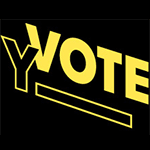Fall Pizza and Politics Forums
Our powerful summer series of focus groups and co-design sessions culminated in the creation of a student-driven Fall Action Plan, comprised of monthly Pizza and Politics Forums for two different cohorts to accommodate size and student availability:
Overarching Goal: Increase youth voter turnout & civic engagement to make an impact in and beyond our communities.
Format: Two hour Pizza and Politics Forums monthly, with students participating in either of two cohorts on Weds or Thursdays of the month, from October through January. In January 2018, we’ll caucus together to decide what we want the spring to look like.
Framework: To be an effective advocate, you have to ASK for things. Each Forum develops an ASK—an Action, a Skill, and Knowledge—and engages with a phase of design thinking—a solutions-oriented approach towards problem solving—towards the development of effective action plans. Each month, participants are supported in taking direct and immediate action, which will serve as research and rehearsal for bigger 18 in ‘18 actions.
OCTOBER PIZZA & POLITICS FORUMS
|
ASK of the Month A- Voter Registration and Turnout S- Self/Peer Organizing K- Who can (and can’t) register? What’s entailed in registering? What gets in the way, structurally and personally, between registering and actually VOTING? |
After welcoming in new members and reconnecting, we plunged into analysis of who can (and can’t) vote, and some of the challenges voters face (Handout HERE.) We honed in on:
-
-
- who CAN vote (i.e. citizens, those over 18, etc)
- who CANNOT vote (i.e., noncitizen, under 18, felon, etc.)
- who CAN but DOESN’T vote —a big focus of YVote
-
After some discussion, we introduced Why convincing voters to commit–themselves and others–is this month’s action. We broke into small groups to talk about how we might talk about voting with different folks—18 year olds, friends, relatives; to identify at least 2-3 people they could help COMMIT to vote; to discuss anticipated challenges; and to plan for how to followup to KNOW if those we influenced actually voted. Then we launched into perhaps the most engaging and enjoyable part of the evening—role plays—in which, in pairs, Person A created a persona of a specific non voter and Person B engaged them in dialogue to try to understand more about why they were planning not to vote and to try to figure out how they might motivate Person B to vote.
Samples of the role plays can be viewed here and here.
A few debriefs of role plays and what they discovered about , can be viewed here and here and here and here. In the rich debriefing afterwards, youth shared what their respective partners had done that was (or wasn’t) effective in persuading them (samples here and here and here and here) which led to broader discussion about what deters people from voting, and how to engage respectfully and effectively.
In discussing the debriefing, we underscored the degree to which this is part of the Empathy process that is the focus of this month’s Design Thinking.
We talked about the exercises we’d engaged in earlier in the evening—both analysis of voter registration and turnout information AND role-plays with recalcitrant voters—and how they related to empathy. We talked about what’s hard—really, really hard—in the context of politics today. We talked about how empathy can help us learn:
-
- More about why some people vote and others don’t
- What other factors/aspects we should consider
- How we can make voting feel like a team sport
We concluded the evening with some “vertical empathy”, reaching back in time to investigate and empathize with a moment in history when voting was perceived as being a most vital vehicle for fostering social change, and when young people were willing to put their lives on the line to ensure that disenfranchised people had the right to vote: Freedom Summer 1964. We watched clips from the Freedom Summer documentary (https://www.youtube.com/watch?v=3-Vg6BYcvMc) and discussed:
- What strikes us about Freedom Summer?
- What else do we want to know?
- Are there any implications for our work in 2018?
- Are the stakes different today? How?
We also started to deepen our exploration of the stakes today through reading an article, “Voter suppression is the civil rights issue of this era” (Washington Post, August 2017)
We ended the evening with our closing ritual of Connections, providing a chance for each person to have the floor for a few minutes to reflect on a thought, story, insight, or question that arose in our work.
NOVEMBER PIZZA & POLITICS FORUMS
ASK of the Month
Action: Encourage Registered Voters to Vote AND/OR Accompany someone to the polls (from prior month)
Skill: Self/Peer Organizing
Knowledge: What’s getting in the way of registered voters showing up? What can we do about it?
We got pulses racing at the start of the Forum with a rousing round of YVote People and Politics Bingo, during with youth had to find peers who could attest to having had various kinds of experiences–“I’ve attended a protest” or “I’ve written a letter to an elected official or politician” or “I know someone who is suffering because our society isn’t doing enough to help”–and get their “autographs,” learning about one another while pursuing bingo.
Next, we reflected upon last last month’s Actions–Encouraging Registered Voters to Vote and/or Accompanying Someone to the Polls. In trios or quads, YVoters reflected upon:
- What did you do?
- How did it go?
- What was hard?
- What did you learn?
- What might you do differently?
Responses highlighted how hard this work can be–and how hopeful we are, as a number of youth did inspire reluctant loved ones to vote. Here are some highlights shared by representatives of the small groups.
This month, we moved into Stage 2 in the Design Thinking Process: Defining the Problem and Interpreting the Results. To define the problem at the heart of low rates of youth voting, we examined the 2016 election from four angles, chosen from publications across the political spectrum:
- “Dissecting the Youth Vote” (The Atlantic, Nov 2016)
- “What This Election Taught Us about Millennial Voters” (Bloomberg, 2016)
- “How Millennials Swung Florida for Trump (Breitbart, Dec 2016)
- “Young Voters in the 2016 Election” (CIRCLE, Nov 2016)
In small groups, each person picked a reading to analyze closely and share highlights with partners, leading to discussion of insights & implications for Increasing Youth Voter Turnout.
We discussed the importance of being REALLY clear and specific in defining the problem in order to be able to subsequently generate effective responses to the problem. Youth individually worked to generate “How Might We?” statements for tackling the problem in a way that they personally would be excited to work on, using a frame that is more energizing than demoralizing. They shared with one another, looking for similarities and differences, and will return to these in future months as a fulcrum for their action campaigns.
The last segment of the evening focused on learning basic techniques of the Theater of the Oppressed–a “beyond words” theatrical approach–footage available here. Exercises about “filling space” and becoming mirrors to one another went over particularly well, and YVoters instantly made connections with the work we are doing. Having learned some of the basics, trios of youth progressed to creating stirring tableaus of tyranny, democracy, voting, and more–and interpreting one another’s tableaus (here is one example.) We left energized about having a new visual language with which to communicate our ideas and feelings.
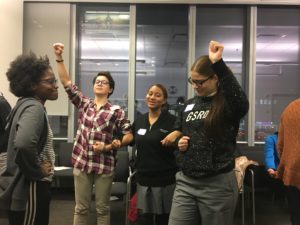
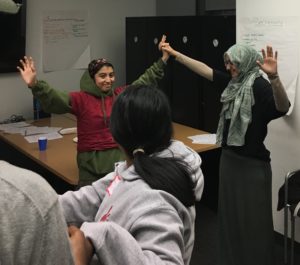
DECEMBER PIZZA & POLITICS FORUMS
ASK of the Month
Action: Make and upload a post to social media on YVote and/or voting
Skill: Online organizing/Making effective social media
Knowledge: What gets attention? What works to drive change through social media? What do other youth need to know in order to turn out in ‘18?
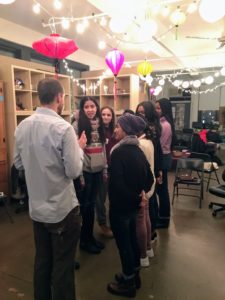
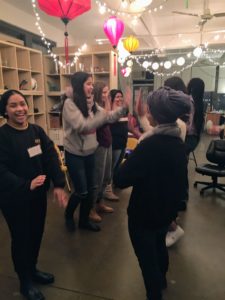
After opening with a lively warm up, revisiting Theater of the Oppressed techniques and subsequently applying them to conjure a word and related gesture for how we’re feeling, we engaged in some recap and shared discussion of current events, from the tax bill to the travel ban to net neutrality to the Alabama election.
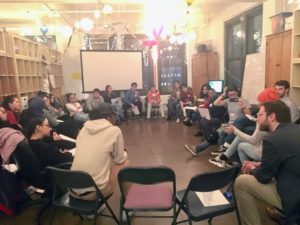
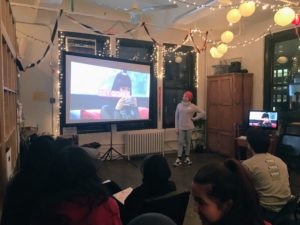
We then plunged into the focus of the evening–Social Media for Social Good–starting with a powerful, practical workshop led by Blair Imani, Civic Action and Campaign Lead, for collaborator Do Something, a digital platform that inspires over 5.5 million youth to sign up for a volunteer, social change, or civic action campaign to make real-world impact on causes teens care about.
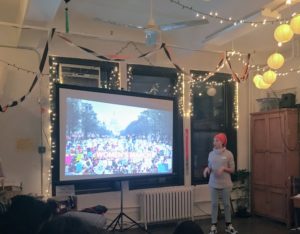
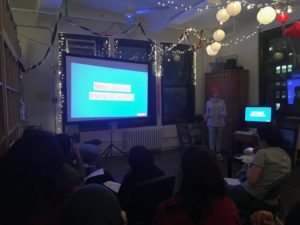
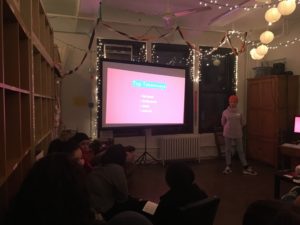
We engaged in rich dialogue about memorable social campaigns, the principles that undergird them, and the platforms that serve them most effectively. We then engaged in Stage 3 of Design Thinking–Ideation–brainstorming various Big Ideas for what media YVote can make to build support for our 18 in ‘18 campaign. Each group came up with some GREAT ones to organize around, from Best Hashtag Ever (report out video here) to Developing an Online Survey to draw teens to YVote through their passions around different issues (report out video here) to Crafting an Op-Ed for mainstream media to Developing a more interactive youth-facing website to creating 30 second PSAs.
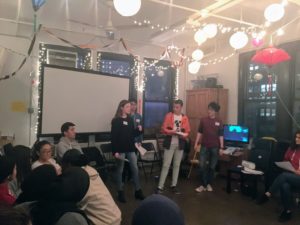
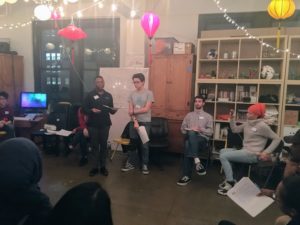
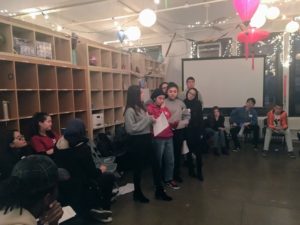
Fun samples of student PSAs can be seen here and here.
Armed with increased skills and knowledge about how to use social media to amplify our impact, we’re excited to pull all the pieces together in January for Stage Four of our Design Thinking: Prototyping Action Campaigns to mount in schools and communities this spring.
